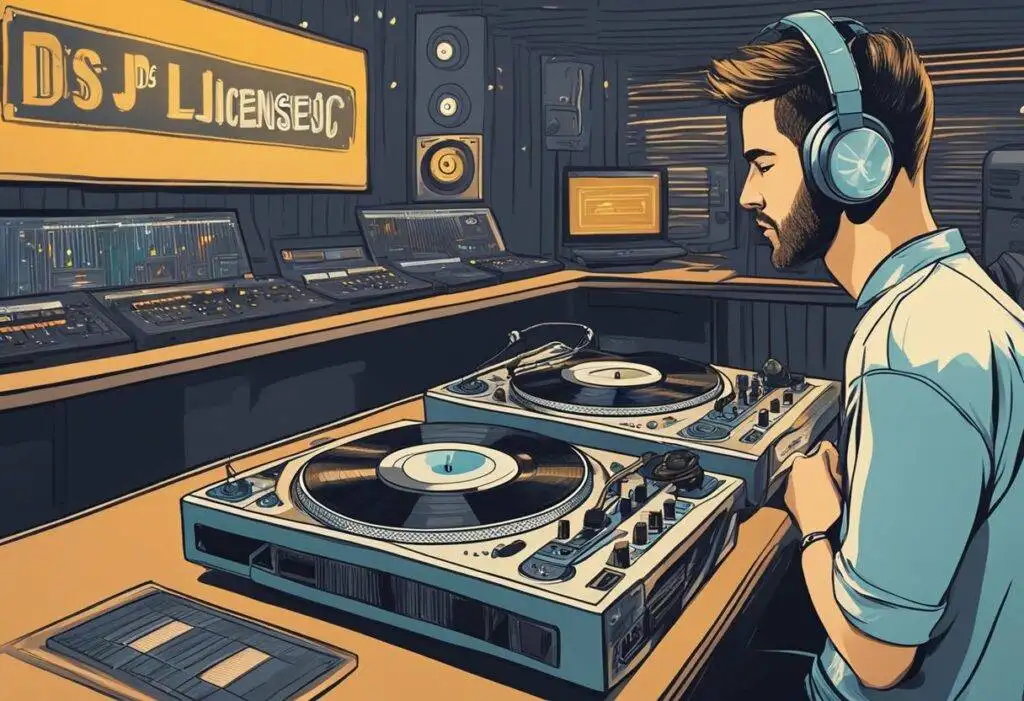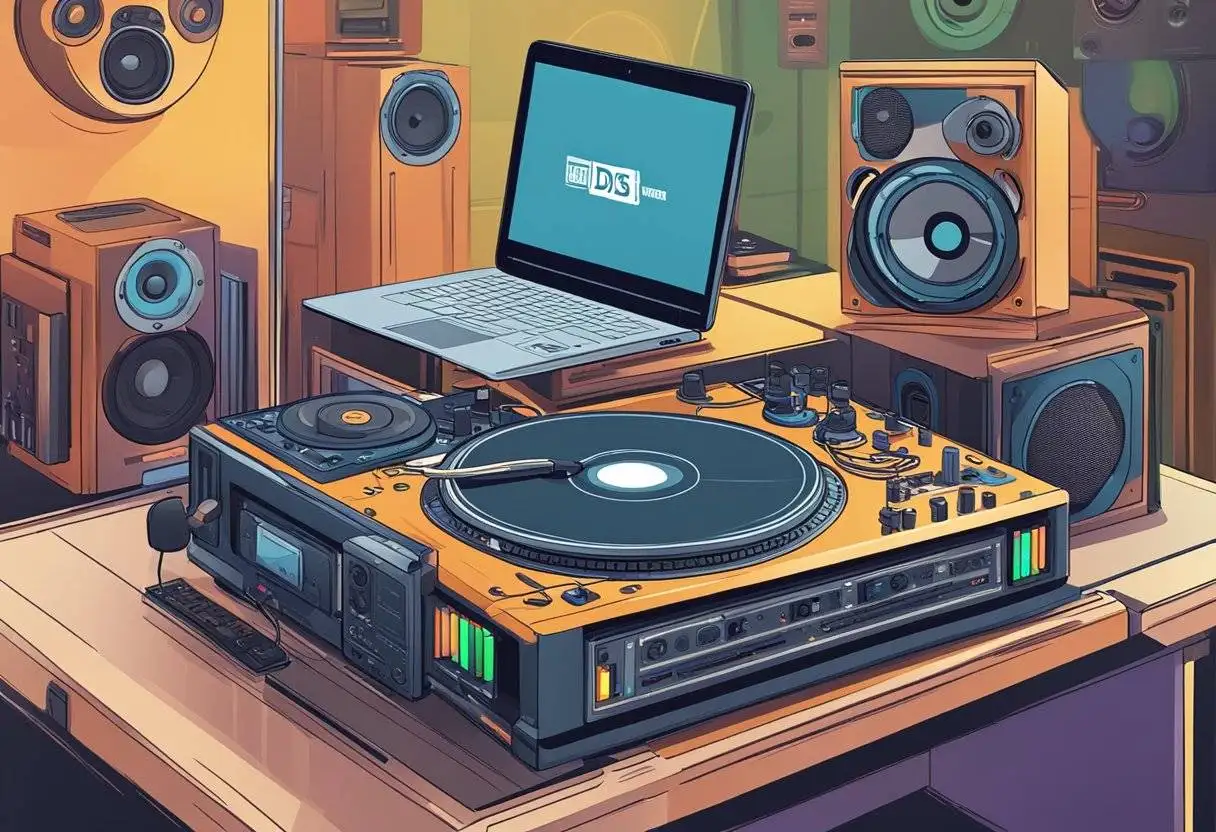As a DJ, navigating the complexities of music copyright and licensing is essential to ensure that you comply with legal requirements when playing music in public settings. Whether spinning tracks at a club, wedding, or private event, the need for a license hinges on several factors, such as the venue, the nature of the event, and who is responsible for the music being played. It’s not just about having an extensive playlist; it’s about having the proper permissions to play that music legally.

Understanding music licensing is crucial because it involves the rights of those who create and own the musical works. The general rule is that if you play music publicly, you are likely required to obtain a license. This license typically covers the copyrights held by composers, songwriters, and recording artists. Operating without the appropriate licenses can result in significant legal and financial consequences. However, it is essential to note that your requirements may vary because some venues might already hold licenses that cover DJ performances.
Key Takeaways
- DJs must comprehend and comply with music licensing regulations to play music legally in public.
- Licensing requirements can depend on the venue and the event type, with potential coverage under existing venue licenses.
- Operating without a music license can lead to serious legal and financial repercussions.
Understanding Music Licensing for DJs
In the realm of DJing, understanding the intricacies of music licensing is crucial. My role as a DJ not only involves mixing and playing music but also ensuring that I’m compliant with copyright laws to respect artists’ rights and fulfill legal obligations.
Legal Foundations of Music Rights
Copyright law is the bedrock protecting the rights of artists and composers. When I play a track, I’m legally obligated to ensure that the copyright holder’s permission is in place. Copyright provides exclusive rights to the creators of original work to reproduce, distribute, and perform their art in public. A public performance license grants me the ability to play copyrighted music in venues, ensuring the original artists receive their due royalties.
Role of Performing Rights Organizations
Performing Rights Organizations (PROs) such as ASCAP, BMI, and SESAC, function as intermediaries between artists and entities like myself that wish to play their music publicly. By obtaining a music license through these organizations, I am given the rights necessary to legally play music to audiences. The PROs collect fees from license holders like me, which are then distributed as royalties to artists. This system helps uphold the artists’ rights while providing DJs the access needed to play a diverse range of music.
Requirement for a DJ License
In my experience, understanding when and where I need a DJ license is crucial to adhering to copyright laws and ensuring artists receive their royalties. A DJ license typically covers the legal use of music for public playback.
When and Where DJs Need a License
Public Events: Any time I perform at a public event, whether it’s at a club, weddings, or larger gatherings, I need a license to play copyrighted music. This ensures that songwriters and artists get paid for their work.
Online Streaming: If my performance is being broadcasted or streamed online, an additional license might be required since I’m reaching a digital audience as well.
Private vs. Public: Playing music at private parties often doesn’t require a license but moving to a public venue dictates the necessity for one. The distinction here is typically whether an audience is charged admission or the venue is open to the public.
Venues: Some venues already hold their own blanket licenses that cover DJs. However, I make sure to confirm this beforehand, as being non-compliant with licensing laws can result in hefty fines.
As a DJ, I understand the importance of abiding by copyright laws to avoid legal issues. This means ensuring I have the necessary licenses and comprehend the intricacies of royalties and compensation.
Acquiring the Right Licenses
For me, playing music in public venues requires obtaining permission through music licensing organizations. These licenses are contracts that grant me the legal right to play copyrighted material. I need to pay for these licenses; they are not free. When I play music, the venue might sometimes hold a blanket license that covers my performance. However, if that’s not the case, I need to personally hold a license like a public performance license. This ensures that artists, producers, and labels receive compensation for the use of their work.
Understanding Royalties and Compensation
Every time I play a track, money changes hands in the form of royalties. These are paid to copyright owners – typically artists and labels – as compensation for the use of their work. As a DJ, it’s essential for me to understand that not paying royalties can lead to copyright infringement issues. This might not only result in expensive legal fees, but can also tarnish my reputation. Royalties are generally handled by the music licensing organizations, and some of my licensing fees go towards paying these royalties. Making sure these entities are compensated is not only ethical but a legal obligation.
Managing DJ Business Responsibilities
In my DJing career, I’ve come to realize that running a successful DJ business involves much more than spinning tracks. It requires a thorough understanding of business and insurance considerations to protect both my services and interests.
Business and Insurance Considerations
Business License: Whether DJing as a professional or a hobby, it’s crucial for me to obtain the appropriate business license. The specific licensing requirements can vary based on location, but generally, they legitimize my operations and ensure compliance with local regulations.
DJ Insurance: Carrying adequate DJ insurance, particularly liability insurance, is non-negotiable. It safeguards against claims arising from injuries or damages that could occur during a performance. The right insurance also provides peace of mind when I’m focusing on my music and style.
Expenses and Tax: I carefully track all my expenses, from equipment and headphones to travel and marketing. This is not only essential for managing my finances but also for accurately reporting my income for tax purposes.
Licensing Requirements: It’s imperative for me to understand various licensing requirements. While venue licensing often covers performance rights, there are scenarios where individual licensing, such as a digital license, is necessary for playing copyrighted music.
Equipment: Investing in high-quality equipment and keeping it in top condition is part of my operational expenses.
Insurance Table:
| Insurance Type | Purpose |
|---|---|
| General liability insurance | Covers third-party bodily injury and property damage that can occur at events. |
| Equipment insurance | Protects my gear from theft, damage, and other losses. |
In managing these aspects of my DJ business, I ensure that I’m not only delivering great performances but also running a secure and compliant operation.
Frequently Asked Questions

In this section, I’ll answer some of the common questions regarding the licensing needs of DJs playing music. These FAQs highlight what you, as a DJ, need to know about the legal aspects of spinning tunes.
What are the different types of music licenses required for DJs?
To play music publicly, DJs often need a Public Performance License (PPL) for each piece of copyrighted music they play. These licenses are typically granted by collecting societies like ASCAP or BMI.
How can a DJ legally obtain a license to play music?
A DJ can obtain a license by contacting the appropriate music rights organizations, which may include Performing Rights Organizations (PROs) such as ASCAP, BMI, or SESAC in the United States. These organizations issue licenses that allow DJs to play copyrighted music in public.
What are the consequences of playing music without a DJ license?
Playing music without a proper license could lead to legal action for copyright infringement. This can result in hefty fines and possibly litigation if a DJ plays copyrighted music without permission.
Do DJs need to pay licensing fees to organizations like ASCAP and BMI?
Yes, DJs need to pay fees to PROs like ASCAP and BMI. These fees are for the licensing rights to play copyrighted music in public settings.
Is there specific music that DJs can play without a license?
DJs can play music that is in the public domain or music for which they have received direct permission from the rights-holder without needing a license. Some creators also release their music under creative commons licenses that may not require additional licensing.
What is the importance of having insurance in conjunction with a DJ license?
Having insurance is important because it provides financial protection against various liabilities. I understand that insurance can cover damages for which a DJ might be responsible during performances, separate from the concerns addressed by a music license.
